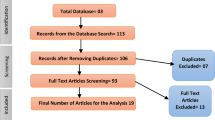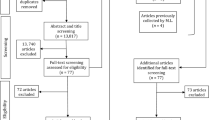Abstract
Mental health professionals acting as expert witnesses are expected to testify about the prevalence of sexual abuse, and also about the veracity of memory. In cases involving adult survivors of sexual abuse, this testimony is typically about repressed and false memory syndromes. Many professionals have noted concerns about the lack of definitive data to support either syndrome. This study examined the following variables: juror knowledge and experience with repressed and false memory syndromes, juror attitudes about sexual abuse and memory recovery techniques, and gender of juror on verdict. Results include effects for repressed memory knowledge/experience and gender. Gender differences were found regarding attitudes about abuse and memory. Concluding comments include practical and research implications of the study results.
Similar content being viewed by others
References
American Psychological Association (1996, February 14). APA panel addresses controversy over adult memories of childhood sexual abuse [Announcement] Washington, DC: Author. Retrieved from the World Wide Web March 15,2000: http://www.apa.org/releases/abusemem.html.
Baker, R.A. (1992). Hidden memories: Voices and visions from within. Buffalo, NY: Prometheus Books.
Beattie, B. (1993). The inequity and inappropriateness of applying statutes of limitations to civil action arising from childhood sexual abuse. Family and Conciliation Courts Review, 31, 65–89.
Bottoms, B.L., & Schklar, J. (December, 1995). The proper place for expert testimony. APA Monitor, p. 16.
Briere, J. (1992). Child abuse trauma: Theory and treatment of the lasting effects. Newbury Park: Sage Publications.
Brown, G.R., & Anderson, B. (1991). Psychiatric morbidity in adult inpatients with childhood histories of sexual and physical abuse. American Journal of Psychiatry, 148, 55–61.
Coons, P.M. (1986). Psychiatric problems associated with child abuse: A review. In J.J. Jacobsen (Ed.), Psychiatric sequelae of child abuse (pp. 169–200). Springfield, IL: Charles C Thomas.
Courtois, C.A. (1995). Scientist-practitioner and delayed memory controversy: Scientific standards and the need for collaboration. The Counseling Psychologist, 23, 294–299.
Finkelhor, D., Hotaling, G., Lewis, I.A., & Smith, C. (1989). Sexual abuse and its relationship to later sexual satisfaction, marital status, religion and attitudes. Journal of Interpersonal Violence, 4, 279–399.
Ganaway, G.K., (1991, August). Alternative hypotheses regarding satanic ritual abuse memories. Paper presented at the 99th Annual Convention of the Amercian Psychological Association, San Francisco.
Gembala, F.A., & Serritella, W.J. (1992). Three recent United States supreme court decisions for professionals who testify in child sexual abuse cases. Journal of Child Sexual Abuse, 1, 15–30.
Golding, J.M., Sanchez, R.P., & Sego, S.A. (1999). Age factors affecting the believability of repressed memories of child sexual assault. Law and Human Behavior, 23,257–268.
Golding, J.M., Sego, S.A., & Sanchez, R.P. (1999). The effect of multiple childhood sexual assaults on mock jurors' perceptions of repressed memories. Behavioral Sciences and the Law, 17, 483–493.
Golding, J.M., Sego, S.A., Sanchez, R.P., & Hasemenn, D. (1995). The believability of repressed memories. Law and Human Behavior, 19, 569–592.
Griffith, J.D., Libkuman, T.M., Kazen, J., & Shafir, Z. (1999). Repressed memories in the courtroom: Trial characteristics affecting mock jurors' decision making. American Journal of Forensic Psychology, 17, 5–24.
Griffith, J.D., Libkuman, T.M., & Poole, D.A. (1998). Repressed memories: The effects of expert testimony on mock jurors' decision making. American Journal of Forensic Psychology, 16, 5–23.
Hood, G. (1994). The statue of limitations barrier in civil suits brought by adult survivors of child sexual abuse: A simple solution. University of Illinois Law Review, 417–422.
Kassin, S.M., Williams, L.N., & Saunders, C.L. (1990). Dirty tricks of cross examination: The influence of conjectural evidence on the jury. Law and Human Behavior, 14, 373–384.
Key, H.G., Warren, A.R., & Ross, D.E. (1996). Perceptions of repressed memory: A reappraisal. Law and Human Behavior, 20, 555–563.
Lamm, J.B. (1991). Easing access to the courts for incest victims: Toward an equitable application of the delayed discovery rule. Yale Law Journal, 100, 2189–2208.
Loftus, E.F. (1993). The reality of repressed memories. American Psychologist, 48, 513–537.
Loftus, E.F., Weingardt, K., & Hoffman, H. (1993). Sleeping memories on trial: Reactions to memories that were previously repressed. Expert Evidence, 2, 51–59.
MacCoun, R.J., & Kerr, N.L. (1988). Asymmetric influence in mock jury deliberation: Jurors' bias for leniency. Journal of Personality and Social Psychology, 54, 21–33.
Marsil, D.F., Keeney, J.M., Larson, S.M., Key, H., Woodhall, C.E., Warren, A.R. (1999, June). The believability of recovered memories. Poster presented at the 11th Annual American Psychological Society Convention, Denver.
Mason, M.A. (1991). A judicial dilemma: Expert witness testimony is child sex abuse cases. Journal of Psychiatry and Law, 19, 185–219.
Messler-Davies, J., & Frawley, M.G. (1994). Treating the adult survivor of childhood sexual abuse: A psychoanalytic perspective. New York: Basic Books.
Myers, J. (1993). Expert testimony regarding child sexual abuse. Child Abuse & Neglect, 17, 175–185.
Nagao, D. H., & Davis, J.H. (1980). The effects of prior experience on mock juror case judgements. Social Psychology Quarterly, 43, 190–199.
Nathan, D. (1991). Women and other aliens. El Paso,TX: Cinco Puntos Press.
Ofshe, R.J. (1992). Inadvertent hypnosis during interrogation: False confession due to dissociative state, misidentified multiple personality and the satanic cult hypothesis. International Journal of Clinical and Experimental Hypnosis, 40, 125–156.
Putnam, F.W. (1989). Diagnosis and treatment of multiple personality disorder. New York: Guilford Press.
Ross, C.A., Miller, S.D., Bjornson, L., Reagor, P., Fraser, G.A., & Anderson, G. (1991). Abuse histories in 102 cases of multiple personality disorder. Canadian Journal of Psychiatry, 36, 97–101.
Sagatun, I.J. (1991). Expert witnesses in child abuse cases. Special Issue: Legal and policy issues in mental health services. Behavioral Sciences and the Law, 9, 201–215.
Slovenko, R. (Spring, 1993). The “revival of memory” of childhood sexual abuse: Is tolling the statue of limitations justified? The Journal of Psychiatry & Law, 7–34.
Spanos, N.P., Debreuil, S.C., & Gwynn, M.I. (1991). The effects of expert testimony concerning rape of the verdicts and beliefs of mock jurors. Imagination, Cognition and Personality, 11, 37–51.
Terr, L. (1994). Unchained Memories: True Stories of Traumatic Memories, Lost and Found. New York: Basic Books.
Tetford, I., & Schuller, R.A. (1996). Mock juror's evaluations of child sexual abuse: The impact of memory recovery and therapeutic intervention. Behavioral Sciences and the Law, 14, 205–218.
Tsai, A.C., Morsbach, S.K., & Loftus, E.F., (1999, June). Importance of the nature of the crime in repressed memory studies: An American Psychological Society Convention, Denver.
U.S. Department of Health and Human Services, Children's Bureau. (1998). Child Maltreatment 1996: Reports from the States to the National Child Abuse and Neglect Data System. Washington D.C.: Children's Bureau, U.S. Department of Health and Human Services.
Walker, L.E. (1990). Psychological assessment of sexually abused children for legal evaluation and expert witness testimony. Professional Psychology: Research and Practice, 21, 344–353.
Whitehead, T.M. (1992). Application of the delayed discovery rule: The only hope for justice for sexual abuse survivors. Law and Psychology Review, 16, 153–170.
Author information
Authors and Affiliations
Corresponding author
Rights and permissions
About this article
Cite this article
Rotzien, A.L. Factors influencing juror verdict in a case involving repressed memories of abuse. Curr Psychol 21, 220–239 (2002). https://doi.org/10.1007/s12144-002-1015-x
Accepted:
Issue Date:
DOI: https://doi.org/10.1007/s12144-002-1015-x




